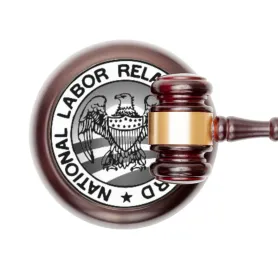On June 23, 2020, the National Labor Relations Board (“NLRB” or “Board”) overruled a 2016 decision that required employers to bargain over the discipline of employees during negotiations for a first contract. The Board noted that the decision it issued Tuesday in 800 River Road Operating Co., LLC d/b/a Care One at New Milford, 369 NLRB No. 109 (“Care One”), reinstated “the law as it existed for 80 years,” under which the National Labor Relations Act (“Act”) did not impose a “predisciplinary bargaining obligation” on employers with newly-unionized workforces. The Board’s restoration of what had been well-settled law under the Act reinstates employers’ ability to apply disciplinary policies in accordance with past practice while negotiating a first collective bargaining agreement (“CBA”).
The Obama Board’s Prior Imposition of a New Statutory Obligation to Bargain Over Discipline
In 2016, a Board majority, with then-Member Miscimarra dissenting, held in Total Security Management Illinois 1, LLC, 364 NLRB No. 106 (“Total Security”) that employers have a statutory obligation to bargain with a union before imposing “serious discipline” on employees once a union has been certified to represent the employees, but before the parties have reached agreement on a first contract. The Board in Total Security based this purported statutory obligation on the well-established body of law that requires employers to maintain the status quo with regard to terms and conditions of employment that constitute a mandatory subject of bargaining once a union is certified (or voluntarily recognized).
Under the now rejected Total Security standard, employers that had not yet entered into a collective bargaining agreement with a union were required, with few exceptions, to provide notice and an opportunity to bargain before serious discipline of employees represented by that union because such actions involved discretionary considerations. The notice and bargaining obligation of Total Security applied even if an employer simply adhered to an established disciplinary policy already in place before a union became the representative of an employer’s workforce. The limited exceptions to this obligation applied when an employer imposed something less than “serious discipline” (under the Board’s ambiguous definition of that term), an employee’s presence at work posed “a serious, imminent danger to the employer’s business or personnel,” or where an employer and union negotiated and implemented an interim grievance-arbitration procedure before agreement to a final CBA. As presciently noted in the Total Security dissent, the Total Security-imposed bargaining obligations, “replete with qualifications and exceptions . . . ma[de] it impossible for parties to achieve any reasonable measure of certainty and predictability.”
A Return to Well-Settled and Common Sense Bargaining Obligations
In Care One, the Board returned to established precedent regarding the obligation to bargain over employee discipline before parties reach agreement on a first contract. In the unfair labor practice charges filed against the employer in Care One, the union alleged that the employer ran afoul of the standard announced in Total Security by imposing discipline after the union’s certification, but before the parties entered into a CBA. Specifically, the union alleged that the employer violated the Act by suspending and discharging employees pursuant to an established disciplinary policy without first providing the union notice and an opportunity to bargain over the discipline.
Reversing the Administrative Law Judge’s decision, the Board rejected the findings that the employer violated the Act by imposing discipline without first bargaining. The Board held that the correct analysis for evaluating such discipline “must focus on whether an employer’s individual disciplinary action is similar in kind and degree to what the employer did in the past within the structure of established policy or practice.” Because the employer “applied its preexisting disciplinary policy” in disciplining the employees, the employer’s imposition of discipline was consistent with the Act, even though the disciplinary decisions included the use of discretion and took place without first bargaining with the union.
The standard (re)announced in Care One also is fully consistent with the most recent significant guidance from the Board regarding employer obligations to maintain the status quo with respect to mandatory subjects of bargaining. Citing its 2017 decision in Raytheon Network Centric Systems, 365 NLRB No. 161, the Board in Care One “recognized that discretionary aspects of a policy or practice are as much a part of the status quo as the non-discretionary aspects.” Accordingly, “in order to maintain the status quo, an employer must continue to make decisions materially consistent with its established policy or practice, including its use of discretion, after the certification or recognition of a union.” By reversing the contrary standard set forth in Total Security, as well as the unworkable qualifications and exceptions to that standard, the Board’s decision in Care One serves to remove the uncertainty and conflict over bargaining obligations produced by the Board’s 2016 departure from longstanding principles regarding the duty to bargain.
The Board’s decision applies both prospectively and retroactively to “all pending cases in whatever stage,” thus providing welcome relief to all employers recently involved in the negotiation of a first contract.




 />i
/>i

